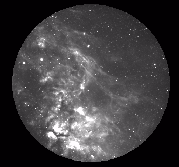
![[Virginia Tech Department of
Physics]](vtlogo.gif)
VTSS
The Virginia Tech Spectral-Line Survey
Spectral Line Imaging Camera (SLIC)
This system is used to image faint Galactic H-alpha emission over wide
fields. It consists of a cryogenically-cooled Tektronix 512x512 CCD with 27
micron pixels in the focal plane of a fast (f/1.2) Noct-Nikkor lens.
The pixel size is 1.6 arcminutes.
A filter
wheel ahead of the lens enables imaging with a narrow bandpass H-alpha
interference filter (1.75 nm bandpass), various wider continuum filters,
and a [SII] doublet filter (6717, 6731 angstroms). A rotatable polarizer has
been attached ahead of the filter wheel, on occasion, to explore the
polarization of the H-alpha emission.
The CCD package, including dewar, and control and image acquisition
systems, is manufactured by Photometrics Ltd.
We use metal oxide
filters with very small thermal shift,
produced by Barr Associates of Westford, MA.
The camera is optimized for brightness sensitivity. The system can
detect emission of
about 1 rayleigh
for line-of-sight hydrogen velocities
between plus and minus 100 km/s (1 rayleigh = 1 R =
10 /4
/4 photons
per square cm per second per steradian).
A brightness of 1 rayleigh corresponds to an emission
measure of about 2 pc per cm
photons
per square cm per second per steradian).
A brightness of 1 rayleigh corresponds to an emission
measure of about 2 pc per cm .
.
The imaging system is equatorially mounted. Tracking to arcsecond precision is
assured through the use of a separate Santa Barbara Instruments Group
ST-4 auto-tracking CCD attached to a five-inch Celestron
telescope mounted in tandem with the camera.
The system is mounted on an enclosed concrete
pier at the Martin Observatory on the grounds of the Miles C. Horton, Sr.
Research Center, located in an isolated region of southwestern Virginia.
![[Picture of front of SLIC]](slic01.gif)
This image shows the front of SLIC. On the left is a filter wheel,
through which light passes before entering the f/1.2 58mm lens and
arriving at
the 512x512 CCD. On the right is
mounted a Celestron-5 telescope which utilizes the
ST-4 auto-tracking CCD to maintain accurate pointing during an
integration. The instrument cradle is mounted on a Celestron CG-11
equatorial head produced by Losmandy. The mount is bolted to a concrete pier.
![[Picture of back of SLIC]](slic02.gif)
This image shows another view of SLIC's instrument cradle showing the C5
tracking telescope (foreground) and the Photometrics CCD dewar (background).
VTSS |
Virginia Tech Physics |
Virginia Tech Astrophysics |
Virginia Tech
![[Virginia Tech Department of
Physics]](vtlogo.gif)

![[Virginia Tech Department of
Physics]](vtlogo.gif)
 /4
/4 photons
per square cm per second per steradian).
A brightness of 1 rayleigh corresponds to an emission
measure of about 2 pc per cm
photons
per square cm per second per steradian).
A brightness of 1 rayleigh corresponds to an emission
measure of about 2 pc per cm .
.
![[Picture of front of SLIC]](slic01.gif)
![[Picture of back of SLIC]](slic02.gif)